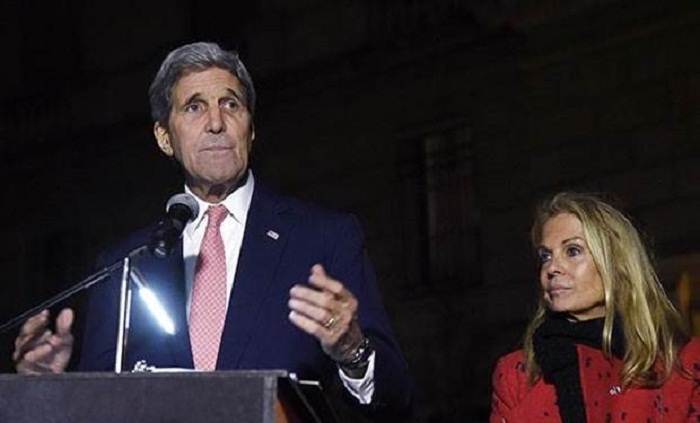Kerry’s plane landed in the Somali capital just before noon local time where he was greeted by the president, the prime minister and other Somali officials.
The previously unannounced stop underscored American solidarity with the Somali government as it tries to fight militants allied to al-Qaeda and other Islamic groups and cope with hundreds of thousands of refugees fleeing the country.
Security was tight. Somalia’s embattled government only found out very recently that Kerry was due to visit.
Top of the agenda was the government’s fight against al-Shabab Islamic militants.
“The next time I come, we have to be able to just walk downtown,” Kerry told the Somali leaders after arriving, adding he was glad to be in the Somali capital.
Somali President Hassan Sheikh Mohamoud told Kerry that Mogadishu “is very different now than it was two years ago.”
“The roads are less bumpy and we have traffic jams,” he told Kerry.
Kerry joked that traffic jams were good and meant the country was “getting normal.”
“Step by step,” the American secretary of state said.
The stop came one day after Kerry said the United States will provide an extra $45 million for the United Nations to help an overwhelmed Kenya cope with 600,000 refugees fleeing civil unrest, terrorism and violence in both Somalia and South Sudan.
After meeting with President Uhuru Kenyatta, Kerry said he was confident that Kenya would not close the world’s largest refugee camp, now home to 350,000 Somalis. The government had threatened to dismantle the Dadaab camp complex — consisting of five camps near the border with Somalia — because it suspects that the militant group al-Shabab has planned attacks from the camp, including one last month at Garissa University College in which 147 people were slaughtered.
Authorities have provided no evidence to support that claim
The United States has opposed dismantling the camps, which could leave many refugees with little choice but to return to the dangerous conditions they fled.
Only a small fraction of the camp’s refugees have agreed to return through a U.N. voluntary repatriation program. The United Nations set up the first camps at Dadaab in 1991, and many who live in the sprawling complex are teenagers and children who have never been to the countries their parents fled.
More about:
















































